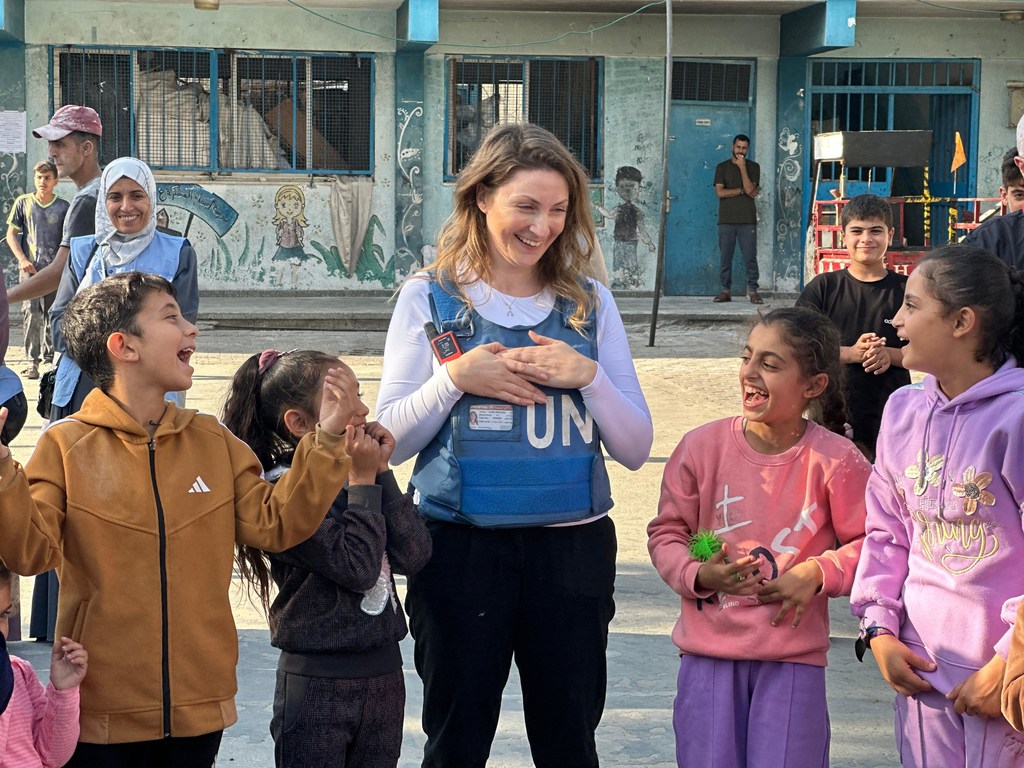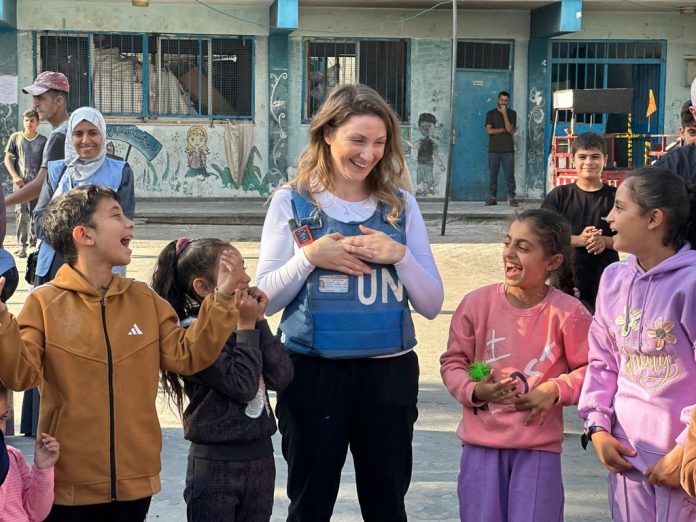“My team — my friends — are the reason I stand where I am today.
This will, inevitably, evolve into a homage to them, but also to the Gaza I was so fortunate to know. Those who have known Gaza will understand exactly what I mean. The Gaza that existed before… before the unimaginable devastation that now eclipses its memory.
The first few months of this brutal war were a blur of emotional voice notes from friends saying goodbye, thinking they wouldn’t make it through the night. These desperate exchanges were followed by agonizing silence. Mona’s words still haunt me: “If we don’t meet again, remember me. Remember my son.” People fought to survive, cut from connection not only with each other and their families, but also the outside world – who were scouring news and social media for any updates.
Mohammed’s daughter Sama was born October 31 2023 in Gaza City. Ambulances were overwhelmed, responding to casualties from bombings, he had to evade strikes to get his wife to a hospital. She gave birth surrounded by death. A few weeks later, my colleague’s four-year-old daughter, Salma, was shot in the neck by Israeli forces as the family were trying to flee Gaza city. She died in his arms in the street. The pain is permanently etched on his face.‘They’re shooting at us in the courtyard’
At the start of this year, we lost contact with Hussein for a week, when the UN facility his family were sheltering in, was besieged, surrounded by tanks, trapping over 40,000 people inside. The last message we got from him: “they’re shooting at us in the courtyard”. Ambulances and emergency teams were denied access. When we finally got through to him again, he was burying the bodies of those killed, including children, in the courtyard.
Some of the most impactful footage of this war was taken by my colleague Abdallah. In February, Abdallah was hit in a strike while documenting northern Gaza. On a Saturday afternoon, we were informed he had been killed. I remember so vividly the air leaving my lungs, and not being able to re-fill them. By Monday, someone had found Abdallah in a hospital – alive, with both his legs amputated. Soon after, we lost contact with him for fourteen long days, while doctors fought to keep him alive in Al-Shifa, as the entire hospital came under Israeli siege. Miraculously, after 4 attempts, the UN eventually reached him
And then there was April. I was finally permitted entry to Gaza, for the first time since the war began. The first place I visited was a field hospital in Rafah, where Abdallah was barely being kept alive. It was a tent in the sand. Doctors informed us he only had days to live, because they did not have the equipment or medicine necessary to treat him further. My two colleagues with matching blood types donated their blood on the spot, just to keep him alive. Two long months after being hit, Abdallah was approved medical evacuation, mere days before the Rafah crossing was closed permanently. To this day, it is hard to believe he survived.
In May, everything fell apart in front of our eyes. The joy we shared to be reunited and the relief Abdallah was safe was short lived, as military incursions in Rafah began. It was chaos, panic, and terror. I was stunned to witness, first-hand, over a million people being forcibly displaced from a confined area in just a matter of days. One of the first people I knew to flee Rafah was Jamal. He followed instructions from forced evacuation notes dropped from the sky, and moved his family to Deir al Balah. That same night, he was killed by an Israeli strike, while sleeping with his family.

UNRWA worker Louise Wateridge participating in psychosocial activities with children at a school in Gaza City (Nov 2024)
Is the world still looking?
One of the last people I knew to flee Rafah was Mohammad. He wore a heavy, unspoken fear and denial of what was happening around us. Echoes of “but where do we go” filled every anxious look and conversation. Mohammad stayed until that night – the night a headless child was pulled from a tent on fire after an Israeli strike – infamous because images circulated globally. All eyes on Rafah, they said. Outside it seemed, nobody knew or understood that this was every night… but the visuals don’t always make it out of people’s nightmares to play across the world media. The screams of children helplessly burning alive around Mohammad still play in his head every night.
If you have read this far, then you will know why I am here in Gaza. You will understand why my life has been on hold, to do what I can to spend time with my friends, and report on the continued horrors that have engulfed their lives. Report on the families who scream at us in despair, desperate for information on loved ones who have been detained for months. Report on the bodies we see of people around checkpoints, left to be eaten by packs of dogs. Report on toddlers in hospitals with missing limbs after strikes in “humanitarian zones”. Mona’s brother, killed. Hussein’s daughter, killed. Rajaa’s cousin, killed. Are you keeping up with the death? Because we’re not. Here, you’re considered lucky if you actually know if your family are alive.
The journalists on the ground – risking life and limb every day to show the world the horrors consuming their friends, their families, their neighbours. Is the world still looking? Did everyone outside get tired of hearing about children killed in every way possible: killed by strikes, killed buried under rubble, killed by malnutrition, killed by hospitals being bombed, killed by incubators shutting off without electricity, killed for simply existing. An entire society is now a graveyard, yet nobody has had the luxury to mourn, because they have to survive. Food, water, healthcare, safety – how is it possible that we are ending another year, and such basic needs continue to be deprived? 100 hostages are still in Gaza, their families desperately awaiting their return and news of their safety. Over two million people, trapped. They cannot escape. There is no way out.
For me, I will never forget singing happy birthday to baby Sama, now one year old – everyone united in their determination to be louder than the bombs falling around us, shaking the ground we stood. Her entire life, consumed and defined by the brutality of war.”

